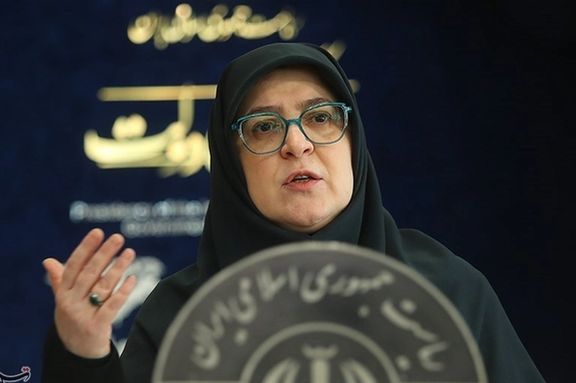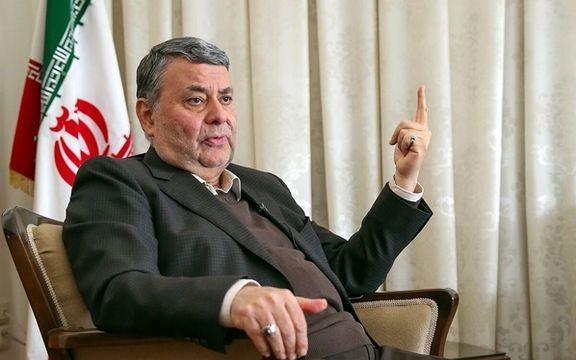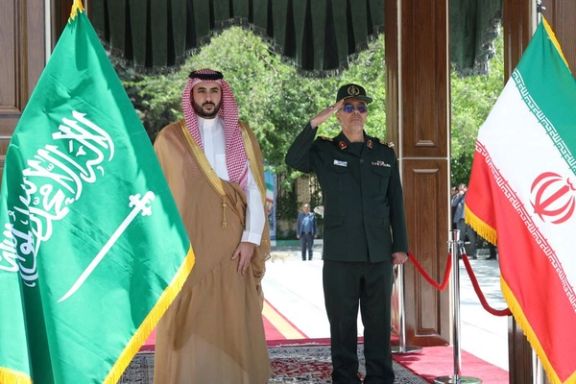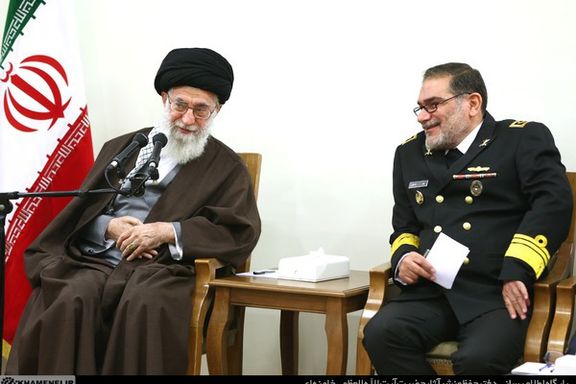Iran signals progress in indirect US talks

Indirect negotiations between Iran and the United States have been positive so far, the Iranian government spokesperson said on Sunday, adding that Tehran welcomes any initiative to lift sanctions.

Indirect negotiations between Iran and the United States have been positive so far, the Iranian government spokesperson said on Sunday, adding that Tehran welcomes any initiative to lift sanctions.
Speaking to the state news agency IRNA, Fatemeh Mohajerani said of the second round of indirect talks held in Rome, "These negotiations are being held with Oman's mediation and in a constructive atmosphere".
Highlighting the importance of lifting sanctions which have crippled Iran's economy since 2018 when US President Donald Trump pulled out of the JCPOA nuclear agreement, she said, “In the continuation of the negotiation path, we will welcome any practical initiative aimed at lifting sanctions".
Since then, further sanctions have been levied on Iran from around the world for both its crackdown on protesters and human rights abuses at home, as well as Iran's support for Russia's war on Ukraine.
She confirmed that expert-level consultations would continue in the coming days, followed by higher-level talks in Muscat.
However, she also pointed to Supreme Leader Ali Khamenei's position of being neither optimistic nor pessimistic about the negotiations.
"We are neither extremely optimistic nor extremely pessimistic about these talks," Khamenei said last week, adding however that “we are very pessimistic about the other side, but we are optimistic about our own capabilities."
Separately, Iranian Foreign Minister Abbas Araghchi wrote on the social media platform X on Saturday night that "optimism may be justified, but only with great caution."
"The second round of negotiations of talks were good and positive in a positive atmosphere."
He added that Iran had explained why the 2015 nuclear deal (JCPOA) was no longer sufficient for many in Iran.

Iran's judiciary has announced legal action against the heads of two media outlets following their commentary on the ongoing nuclear negotiations between the Islamic Republic and the United States.
The judiciary's news agency Mizan reported on Saturday that "disrespectful remarks by the directors of two media outlets regarding the Iran-America negotiations led to charges being filed against them."
The agency did not initially name the individuals involved.
However, the Revolutionary Guard-affiliated Fars news agency later identified the two as Mostafa Faghihi, owner of the Entekhab News Website, and Sajjad Abedi, managing editor of Talkhand-e Siasi (Political Satire).
The move comes shortly after a commentary on Raja News, another outlet linked to the Revolutionary Guard, criticized what it described as a rise in "fake news, rumors, and false accusations" against Supreme Leader Ali Khamenei in both online spaces and some official media.
Raja News specifically accused Faghihi of labeling critics of the nuclear talks as "hardliners with clichéd and nauseating" rhetoric.
The outlet also said that Abedi had dismissed Khamenei's recent statement about not making the country's issues dependent on negotiations as "nonsense."
Abedi responded on the social media platform X, saying that his comment was directed at the hardliners' remarks, not Khamenei's.
Khamenei has shifted his stance on talks since February when he described negotiating with US President Donald Trump as "dishonorable" and "irrational," but less than two months later, he greenlit indirect talks with the US.
This is not the first instance of the Iranian judiciary taking action against media figures commenting on the nuclear issue.
Earlier this month, Mizan reported charges against Hesamoddin Ashena, a former head of the Strategic Studies Center under former president Rouhani's administration, for a social media post criticizing the Islamic Republic authorities regarding Iran's approach to negotiations with the US.
The reformist Shargh daily also offered a public apology after it published a report about the potential renewed role of Mohammad Javad Zarif in the US talks.
Additionally, the Press Supervisory Board issued a warning to the editor-in-chief of the hardline Kayhan daily, which is managed by Khamenei's representative, for threats of assassination against President Donald Trump for the 2020 killing of IRGC's Qasem Soleimani.

US President Donald Trump's primary motivation in nuclear negotiations with Iran is ensuring Israel's security rather than America's, a member of Iran's Expediency Discernment Council said.
Mohammad Sadr argued that Trump's concern over Iran potentially obtaining nuclear weapons stems from the perceived threat to Tel Aviv, not Washington.
Sadr stressed the importance of understanding Trump's personality traits – describing him as narcissistic and unpredictable – arguing they heavily influence US policy.
"We must expect zigzag positions, fluctuations in behavior, and contradictory policies," Sadr said, advising Iranian negotiators to proceed with calm and patience. "We have to prepare ourselves for negotiation ups and downs."
Sadr suggested a deal might be feasible if Trump's focus remains solely on preventing Iran from acquiring nuclear weapons – a goal Iran officially denies pursuing.
"However, if he wants to bring Israel's demands to the negotiating table – including a complete halt to enrichment or [curbs on] Iran's regional presence – naturally we will not reach an agreement," Sadr added.
He added that the outcome hinges on whether Trump's "personal desire for an achievement overcomes Israeli pressure for its security interests."

The rare visit of Saudi Arabia’s defense minister to Tehran ahead of Saturday’s Tehran-Washington talks holds significance for regional security and diplomacy, according to Iranian media and analysts.
The timing of Saudi Defense Minister Prince Khalid bin Salman’s visit to Tehran on April 17—just days before the second round of Tehran-Washington negotiations—has heightened its significance, sending a clear signal to international actors, particularly the United States. The outcome of these nuclear-related talks could directly affect not only the security, defense, and foreign policies of Iran and Saudi Arabia, but also the broader strategic dynamics of the Middle East.
The visit
Prince Khalid bin Salman was accompanied by a high-level 70-member delegation, which included Riyadh’s ambassador to Yemen’s internationally recognized government. According to both sides, discussions focused on strengthening bilateral ties, regional stability, and cooperation on shared interests.
This marks only the second visit by a Saudi defense minister to Iran since the 1979 Islamic Revolution and the first since Prince Sultan bin Abdulaziz's visit in May 1999 during Mohammad Khatami's reformist presidency, which also included a meeting with Iran's Supreme Leader Ali Khamenei.
The Saudi minister's visit came after weeks of threats by President Donald Trump that if Tehran fails to reach an agreement with Washington it can expect some sort of military action.
The trip also coincided with Iranian Foreign Minister Abbas Araghchi’s visit to Moscow and a brief visit to Tehran by IAEA Chief Rafael Grossi, further underscoring the significance of the moment for Iran’s foreign policy.
An assurance of neutrality to Tehran?
Many Iranian media outlets and analysts have highlighted remarks by Ali Shihabi, a Saudi analyst close to the royal court, regarding the visit’s underlying message.
“Saudi is clearly sending a message to Tehran that it will not be a conduit in any fashion towards an attack on Iran,” Shihabi told the Financial Times about the visit. “The kingdom supports President [Donald] Trump’s efforts to find a diplomatic solution to the nuclear crisis, and doesn’t want a war.”
Meanwhile, Iran’s hardline media outlets have warned of threats to regional states if diplomacy fails and Washington opts for military escalation.
“Saudi Arabia and the UAE also want to stay away from Tehran's possible wrath, while reassuring the global energy markets that in the event of a military conflict between Iran and the US, there will be no threat to the region's energy markets or oil fields,” a commentary by the state broadcaster’s Young Journalists Club (YJC) said.
“The Islamic Republic of Iran, while committed to maintaining peace and stability in the region, has repeatedly stated that it will deal with any threat to its national sovereignty and territorial integrity throughout the region,” the commentary added.
Possible Saudi mediation between Tehran and Washington
Iranian media also gave broad coverage to a tweet by independent journalist Laura Rozen, citing a regional source who claimed that Riyadh had “offered to host some sort of US-Iran meeting when Trump visits KSA, but it won’t work at this time.”
Referencing Saudi Arabia’s recent role in hosting Ukraine peace talks, a commentary in the reformist Shargh daily said Riyadh may be seeking a similar role in facilitating US-Iran dialogue. “This could enhance Saudi Arabia’s diplomatic standing on both regional and global fronts,” the article said, adding that the outcome of Iran-US negotiations would undoubtedly shape Riyadh’s future security, defense, and diplomatic strategies, and reverberate throughout the Middle East.
Tehran’s potential role in preventing escalation in Yemen
Analysts in Tehran suggest that one of Riyadh’s key goals was to seek Tehran’s help in preventing potential escalation by the Houthis, particularly in retaliation for recent US strikes. A repeat of the 2019 drone attacks on Saudi Aramco facilities—attributed to the Houthis—remains a major concern.
“Recent US strikes, sometimes carried out without full coordination with its Gulf allies, could jeopardize the fragile ceasefire and spark retaliatory Houthi attacks on Saudi infrastructure, a commentary published by Iran Diplomacy said. “Riyadh knows that the Houthis, while backed by Iran, have independent decision-making powers, but Tehran's influence could be effective in containing their actions.”

Iran’s negotiators are heading to Rome to meet with US envoy with full authority and a mandate rooted in nine principles, according to Ali Shamkhani, former Supreme National Security Council secretary and adviser to the Supreme Leader.
Shamkhani, in a post on X Saturday, said the delegation will approach the talks with seriousness, while expecting concrete guarantees from the US side.
He also referred to balance as one of the principles, meaning no party should walk away with all the gains. Other conditions include “sanctions relief, rejection of the Libya or UAE model, a halt to US threats, swift progress, containment of disruptive actors like Israel, and facilitation of foreign investment.”
“Iran is here for a balanced deal, not surrender,” he wrote. The comments come ahead of Saturday’s scheduled new round of negotiations with the US.
Shamkhani’s statement highlights Iran’s position of maintaining a uranium enrichment program, rejecting the Libyan example when Muammar Gadhafi surrendered his nuclear weapons program, or the UAE model, which is purely civilian.
While the Trump administration appears divided over the goals of the talks with Iran, the president and senior officials have repeatedly emphasized that Tehran must be prevented from acquiring nuclear weapons—implying that Iran’s current uranium enrichment activities should be permanently halted.
Axios website previously quoted an Israeli official as saying Prime Minister Benjamin Netanyahu supports a Libya-style model for Iran—complete dismantlement of its nuclear program.
US Senator Lindsey Graham has also echoed that position, but Iranian FM Abbas Araghchi dismissed it, saying, “They can only dream of that.”

Diplomatic sources told Iran International this week that President Donald Trump’s envoy, Steve Witkoff, “welcomed a three-stage proposal presented by the Iranian side” during the first round of negotiations in Oman on April 12.
The report published on Thursday said that Iran offered to temporarily reduce the level of its uranium enrichment in exchange for significant sanctions relief, including permission to export oil, as the first phase of an agreement with the United States. Later phases would involve Tehran making a “permanent” pledge not to enrich uranium beyond the 3.67% limit set by the Obama-era JCPOA. The arrangement would also include Iran shipping out highly enriched uranium to a third country in exchange for further sanctions relief, including the lifting of longstanding US sanctions.
The sources told Iran International that Witkoff’s positive response to the Iranian proposal surprised their delegation in Muscat.
What the diplomats did not clarify is the fate of roughly 17,000 uranium enrichment machines, known as centrifuges—arguably the most critical component of Iran’s current nuclear program. These are the machines capable of refining uranium to weapons-grade levels of 90%.
Under the JCPOA agreement, Iran was allowed to keep 5,000 machines in operation for ten years, with roughly 7,500 centrifuges kept in storage. That limitation that Tehran has already violated would end in 2025.
Since the US withdrew from the JCPOA, Iran has significantly increased its number of centrifuges in operation and deployed more advanced models with higher output. If Tehran is allowed to retain a substantial portion of this infrastructure, it could resume higher-level enrichment at any time.
The Arms Control Association said in 2022 that, “Several of Iran’s escalatory breaches have resulted in its acquisition of new knowledge and expertise that cannot be reversed.”
The Islamic Republic urgently needs sanctions relief, as its economy is in deep crisis and the national currency has lost nearly half its value since September. If the United States lifts some sanctions and unfreezes assets in exchange for only a temporary reduction in enrichment, Tehran will feel less pressure to move quickly toward further phases of the proposed agreement.
This could allow Iran to stall for time—as it did during the Biden administration—until President Trump nears the end of his term and the 2028 election campaign begins. This may explain why Tehran, according to the report, has prioritized the lifting of oil export sanctions in the first phase.
Iran has consistently insisted that the US must “show good faith” in any negotiation. This has typically meant lifting at least some of the sanctions reimposed by President Trump in 2018. Tehran has also called for an end to US “pressure,” a demand that could reduce Washington’s leverage in protracted talks if sanctions are eased too early.
Iran began enriching uranium to 60 percent in 2021 following a December 2020 parliament decision to retaliate against the US. Interestingly, for more than two years Iran waited during the first Trump term before taking any drastic retaliatory step and only upped the ante after President Joe Biden’s election. Until then, enrichment levels had remained below 5 percent.
If Iran retains its centrifuge infrastructure, it remains capable of resuming high-level enrichment—as it has done since 2021. One of the core criticisms of the JCPOA is that it never fully banned enrichment, and many of its key restrictions are now approaching expiration.
On the diplomatic and economic fronts, a partial or phased agreement would allow Iran to build closer ties with countries such as India, and trade more freely with China and Europe. That would reduce the urgency currently driving Iran’s negotiations—and could complicate US efforts to pursue a phased deal in a meaningful way.